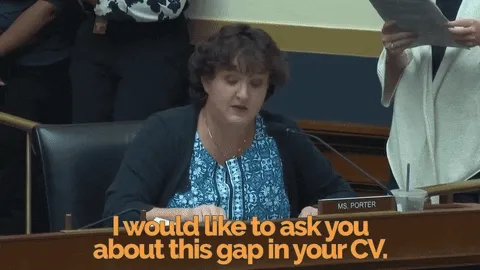PSA to recruiters: Don’t ask about gaps on résumés
After the disruption of the Covid-19 years, recruiters and TA pros should avoid asking candidates about gaps in experience and try asking these questions instead.

Rep. Katie Porter via Giphy
• 3 min read
Mikaela Cohen is a reporter for HR Brew covering workplace strategy.
Do you ever feel like an interrogator when you ask candidates the age-old question: Can you tell me about the gap on your résumé?
There is a never-ending list of reasons why an applicant may have spent time away from work: maybe they were laid off, dealing with the continued upheaval caused by Covid-19, caring for aging parents or kids, or following a calling other than work.
Recruiters and TA pros can approach résumé gaps from a positive perspective, experts advise, in a way that will help them gauge whether an applicant is right for a role.
Shift your mindset. Résumé gaps can present a learning opportunity for recruiters to see how different experiences can add to a role, said Mila Singh, VP of people and culture at Catchafire, a New York-based org that connects volunteers with nonprofits.
“From the perspective of just being an HR and talent leader, gaps are things that could be really positive for someone,” Singh told HR Brew. “Try to understand more about what that person was learning or driving, whether they were looking to build their skills through volunteerism, transitioning from one job to another, or taking time to take care of someone in their family.”
Singh said HR leaders should focus on how candidates used their time away from work and what they learned from it, because it “shows a lot about someone, their motivations, what they’re driven by, and what they’ve learned.”
Maybe just don’t ask. Laura Mazzullo, founder of recruitment firm East Side Staffing, said recruiters who judge gaps on résumés have an “old-school mindset.” Instead, she recommends recruiters only ask questions about the core competencies of the role—what they need to be able to do their job.
“What I have hiring managers do is think about the core competencies this individual needs to bring into the role, and let’s interview against that,” Mazzullo told HR Brew. “That it’s, and not bring[ing] in these biased…judgment calls about an employment gap.”
Or ask this instead. Mazzullo and Singh said there ways of asking about time off that don’t involve the dreaded phrasing of “résumé gap.”
“For HR leaders navigating these conversations, it’s important to be sensitive and caring, and I think it’s also fair to ask: I see that there’s some time between this job and this job, would you mind if I asked to learn a little bit more about what you were doing during that time?” Singh said.
In the wake of the Covid-19 pandemic in particular, Mazzullo said applicants might have been grappling with personal or professional struggles, so recruiters should try to focus on learning their current and future behaviors, instead of their past.
She said you can ask questions like: Who are you now and who do you want to be going forward? How do you want your career to unfold? What are you passionate about? What do you want to be doing more of?
“In order for hiring to evolve and actually be equitable and fair, you can’t always focus on people’s past experiences,” Mazzullo said. “Because then you just tend to hire Ivy League grads who you know from the country club.”
Quick-to-read HR news & insights
From recruiting and retention to company culture and the latest in HR tech, HR Brew delivers up-to-date industry news and tips to help HR pros stay nimble in today’s fast-changing business environment.